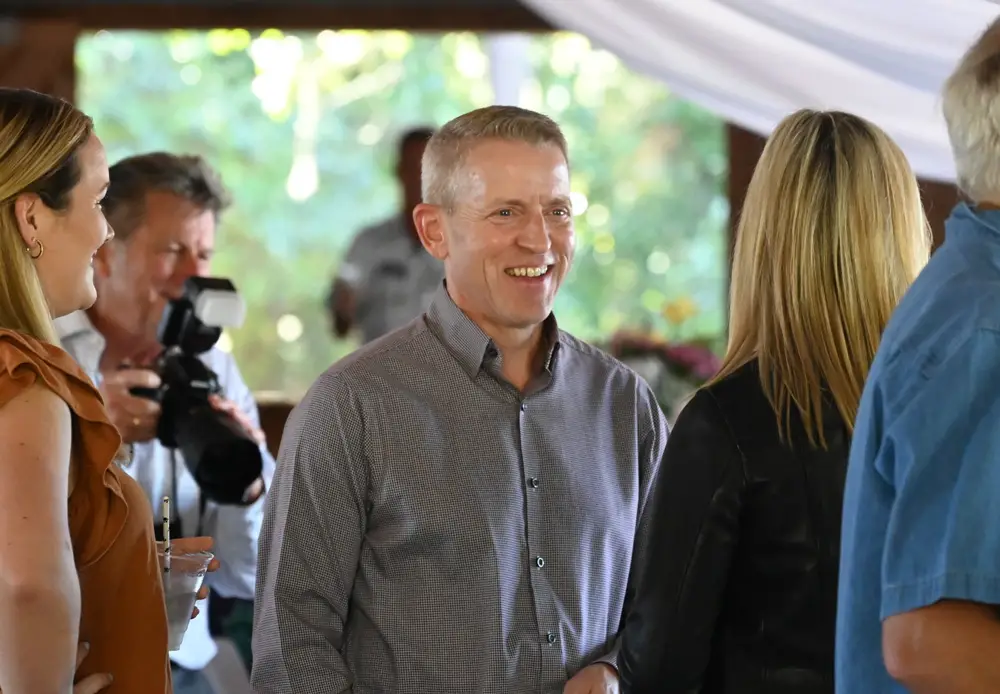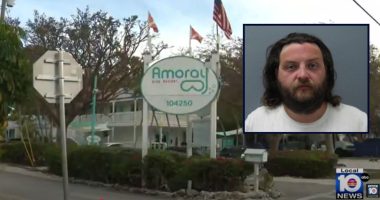
House Speaker Paul Renner, the Republican who has represented Palm Coast at the Legislature for the last eight years, spoke for the first time at length about the record $150 million in appropriations he helped steer toward Flagler County while boasting of a successful session that increased money “across the board” for roads, schools, health care and green spaces. But he remained mum about his future as his term-limited tenure ends this year.
In an appearance on WNZF’s Free For All Fridays, the public affairs show hosted by David Ayres, Renner also explained the very special carve-out Flagler County got from the bill that, after 10 years of trying, scaled back local regulation of vacation rentals, brisk business in Flagler County.
“The idea really is the state on its own doesn’t have the resources to enforce every Airbnb or every vacation rental in every corner of the state. That’s more effectively done at the local level,” Renner said. “Flagler itself is proud of its ordinance and wanted to kind of be like: you like your ordinance, you can keep your ordinance. So we were able to put 2016 as a grandfather date from 2011. That just moves that date forward.” The 2014 bill that Flagler County inspired had 2011 as a grandfather demarcation.
“So anybody that had a county ordinance prior to that time, which Flagler was one, Broward was another, would be able to continue with their ordinance if they chose to do so,” Renner said. they could they could use the new law as well.” The governor has yet to sign the bill, “but it does not include Flagler County.” What Renner did not say–nor boast about–was that it would have been almost inconceivable for Flagler to get that carve-out had he not been in the Speaker’s chair, and had Travis Hutson (himself an ardent advocate of deregulating vacation rentals) not been in his senior-most post.
Renner was also wryly candid about what he may not have been able to say before the session, essentially saying–if not in so many words–that the two sides of the vacation rental controversy got on his and his colleagues’ nerves. “There is never a final chapter on vacation rentals,” he said. “Maybe it’ll be a couple years, but it’ll be back. There’ll be some move to go in one direction or the other. They are never ever easy. And always very controversial. It’s always just, you know, gives everybody, all my colleagues a headache to deal with vacation rentals when there’s a lot of other things and needs in the state. But it’s always, there’s always a push.”
Hutson and Renner are both term-limited and leaving the Legislature. They are also leaving Flagler County at a precipice: after enjoying the two best legislative years in the county’s century-long history, Flagler and its cities will now have to contend with back-benching legislators and a county relegated to ordinary status, even with a seasoned hand like Tom Leek, the Daytona Beach House member and a right hand of Renner’s, winning Hutson’s Senate seat: Leek will not be in senior roles just yet.
“We’re going to be back to having no real clout in Tallahassee is what’s going to happen,” Sheriff Rick Staly, who was a guest with Renner on this morning’s show, said.
Still, Flagler an its cities netted a quarter of a billion dollars in the two years that Renner was House Speaker, a remarkable haul by any standards, especially from a representatives who even on WNZF was describing the session and his role as exemplars of fiscal conservatism.
Renner said the state planned for federal Covid money running out by not creating recurring commitments with the money it did receive. “We made investments, one time investments in infrastructure like $3 billion that we spent, almost $4 billion last year in extra money for road building across the state of Florida.,” Renner said, “environmental and infrastructure like land conservation, water supply, water quality, really investing in the big ticket items that secure our future and if you don’t do that, make those expenditures, you you run the risk of having a grimmer future where you’re more like a Third World than a first world state.”
While not displeased with Tallahassee pork, the public response from Palm Coast has focused on a sharp dichotomy between the projects funded in Palm Coast, and those not: The unbuilt west side of Palm Coast, where council members are pressing an expansion, got $80 million for roads. But older roads in existing neighborhoods got nothing. The legislative appropriation for three segments of the planned loop road from Matanzas Woods Parkway to Palm Coast Parkway adds up to $80 million. The city had requested $187 million.
It had also requested $42 million to four-lane segments of Old Kings Road North and Old Kings Road South, neither of which got funded. On the other hand, last year the city did get $18.3 million for Old Kings Road North, and $25 million for the Matanzas Woods Parkway extension. It also got $500,000 for the design of Old Kings Road South’s widening.
Ayres did not ask him about the dichotomy as Renner spoke of the west-side expansion. “There’s areas that would be developed out there to allow more people to move in,” he said. “But it would be done in a way that would set aside a lot of green space, I think the proposal is to have a pretty world class youth sports facilities, really, really nice, a lot of walking trails, the kind of growth that you’d want as opposed to some of the rapid, uncontrolled growth that gives people some concerns.” (See: “Palm Coast’s Wishful 20-Field, $93 Million Sports Complex Rests on a Far Future of Dubiously Rosy Speculation.”)
“We need to do it in the right way, obviously, but it’s something that is certainly out there in the budget for us to try to get started,” Renner said. The West Side expansion has been a priority of Mayor David Alfin, who said he had devoted his last three years on the job for the sort of culmination Flagler and Palm Coast experienced in legislative appropriations. The city also got $6 million for a future YMCA in Town center, and a few millions more for other projects, including two clean-water projects, while Flagler County got $10 million for greenway acquisition on the west side.
“There’s a lot of money there for, roads, existing roads, and for land conservation for making sure we don’t pave over Flagler County,” Renner said. “One of the things I know I like and led us here is that it’s not a concrete jungle. There’s a lot of green space, you can catch fish and eat the fish you catch, you know, that kind of thing. We want to keep it that way.”
The county was also the chosen location, under Staly’s protectorate–he pursued that allocation–for the Florida State Guard to build its training facility here. The facility for over $10 million in funding for a training center to be located next to the county jail. Staly spoke gratefully for that appropriation. “As the chairman of the board of directors of Florida Sheriffs’ Association, we are seriously going to miss having a former prosecutor and my neighbor in the Florida House,” Staly told Renner. “You have been great for the entire state in really supportive and understanding the needs of law enforcement.”
Renner spoke about “probably close to a billion dollars in new money to create more health care providers and and make sure that we have as our population does grow as our population ages, that we’ve got people to take care of us in the healthcare field.” He gave credit to Senate President Kathleen Passidomo for that one.
As for homeowner insurance, he said the recovery of the property market “is happening as well or better than we probably expected.” He went on: “When I came in as speaker, for a variety of reasons the market was near collapse. Companies were losing billions and billions of dollars and frankly, just packing up and leaving the state. And so we were at a point where we weren’t sure people were going to be able to obtain insurance, which of course if you have a mortgage means your lender saying you got to pay me the whole amount now. We would have an absolute collapse of the property market in Florida. That didn’t happen because we took some bold steps and made some bold reforms to make things better. What we’ve seen is now new companies for the first time coming in to Florida rather than leaving, and those that are here, expanding their footprint.”
A Newsweek report published this week finds otherwise: “The price of properties listed for sale in Florida continues to slide as the state faces a worsening insurance crisis and many sellers struggle with high homeowner association (HOA) fees,” Newsweek reported Wednesday, citing “skyrocketing insurance costs” as one of the reasons. “The state appears nowhere near finding a way out of the insurance crisis that has been unfolding for the past few years. According to the Insurance Information Institute, Florida homeowners are paying the highest premiums in the country, an average of $6,000 in 2023.”
Nevertheless, as Renner noted, six new insurers started writing policies in the state this year alone, and numerous policies are shifting from Citizen’s, the state insurer, to private insurers. “We’re hoping and expecting that in the next series of renewals that things will at least be flat,” Renner said, referring to rates, “and there’s a prospect at least of seeing some some price reductions in the future.”
Renner has resisted saying clearly what he would do when he steps out of the Legislature. There’d been speculation that he was among those wedding himself to Gov. Ron DeSantis’s fortunes when DeSantis was running for president. But that campaign did not go well, leaving many hopefuls wondering what they’ll do next. Renner never let on about that. But this morning when Ayres asked him point blank, “what’s next for Paul Renner when you term out?” Renner evaded the question by going on a long disquisition about what he had accomplished, not what he planned on doing next. Ayres and his co-host Brian McMillan, the Palm Coast Observer publisher, did not press him, opting for a flattering send-off.
![]()
Funding Initiative Requests and Appropriations: 2024 Session
Source: Florida Senate’s Local Funding Initiative Requests page for 2024-25. Click on each funding request for details.
(*) The figures are from the appropriations bill engrossed on March 8, 2024.
(**) Appropriation for the multi-agency facility is funded through the State Guard’s budget.










